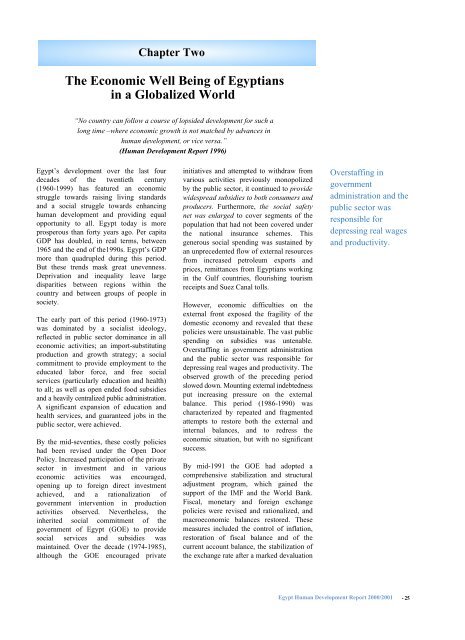English - Human Development Reports - United Nations ...
English - Human Development Reports - United Nations ...
English - Human Development Reports - United Nations ...
You also want an ePaper? Increase the reach of your titles
YUMPU automatically turns print PDFs into web optimized ePapers that Google loves.
Chapter TwoThe Economic Well Being of Egyptiansin a Globalized World“No country can follow a course of lopsided development for such along time –where economic growth is not matched by advances inhuman development, or vice versa.”(<strong>Human</strong> <strong>Development</strong> Report 1996)Egypt’s development over the last fourdecades of the twentieth century(1960-1999) has featured an economicstruggle towards raising living standardsand a social struggle towards enhancinghuman development and providing equalopportunity to all. Egypt today is moreprosperous than forty years ago. Per capitaGDP has doubled, in real terms, between1965 and the end of the1990s. Egypt’s GDPmore than quadrupled during this period.But these trends mask great unevenness.Deprivation and inequality leave largedisparities between regions within thecountry and between groups of people insociety.The early part of this period (1960-1973)was dominated by a socialist ideology,reflected in public sector dominance in alleconomic activities; an import-substitutingproduction and growth strategy; a socialcommitment to provide employment to theeducated labor force, and free socialservices (particularly education and health)to all; as well as open ended food subsidiesand a heavily centralized public administration.A significant expansion of education andhealth services, and guaranteed jobs in thepublic sector, were achieved.By the mid-seventies, these costly policieshad been revised under the Open DoorPolicy. Increased participation of the privatesector in investment and in variouseconomic activities was encouraged,opening up to foreign direct investmentachieved, and a rationalization ofgovernment intervention in productionactivities observed. Nevertheless, theinherited social commitment of thegovernment of Egypt (GOE) to providesocial services and subsidies wasmaintained. Over the decade (1974-1985),although the GOE encouraged privateinitiatives and attempted to withdraw fromvarious activities previously monopolizedby the public sector, it continued to providewidespread subsidies to both consumers andproducers. Furthermore, the social safetynet was enlarged to cover segments of thepopulation that had not been covered underthe national insurance schemes. Thisgenerous social spending was sustained byan unprecedented flow of external resourcesfrom increased petroleum exports andprices, remittances from Egyptians workingin the Gulf countries, flourishing tourismreceipts and Suez Canal tolls.However, economic difficulties on theexternal front exposed the fragility of thedomestic economy and revealed that thesepolicies were unsustainable. The vast publicspending on subsidies was untenable.Overstaffing in government administrationand the public sector was responsible fordepressing real wages and productivity. Theobserved growth of the preceding periodslowed down. Mounting external indebtednessput increasing pressure on the externalbalance. This period (1986-1990) wascharacterized by repeated and fragmentedattempts to restore both the external andinternal balances, and to redress theeconomic situation, but with no significantsuccess.By mid-1991 the GOE had adopted acomprehensive stabilization and structuraladjustment program, which gained thesupport of the IMF and the World Bank.Fiscal, monetary and foreign exchangepolicies were revised and rationalized, andmacroeconomic balances restored. Thesemeasures included the control of inflation,restoration of fiscal balance and of thecurrent account balance, the stabilization ofthe exchange rate after a marked devaluationOverstaffing ingovernmentadministration and thepublic sector wasresponsible fordepressing real wagesand productivity.Egypt <strong>Human</strong> <strong>Development</strong> Report 2000/2001 - 25
















